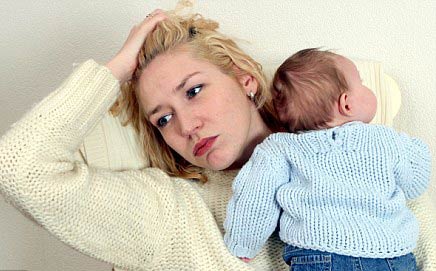|
 'Feeling like a failure': Ms Haga said older mothers may have higher expectations of themselves |
|
Women who wait to have a baby until after they have established their career are more likely to suffer from post-natal depression, scientists say. Older mothers are more likely to 'over-prepare' for their first-born and struggle when things don't go as planned, a study suggests. The findings are of great significance in the UK, where an increasing number of women are choosing to delay motherhood until they are more financially secure. Research leader Silje Marie Haga, from the University of Oslo, in Norway, said: 'There are some indications that older, first-time mothers are vulnerable to postpartum depression, perhaps because they are used to being in control of their own lives: they have completed a long education and established a career before they have children. 'But you can’t control a baby; on the contrary, you have to be extremely flexible. 'Several of the women I interviewed said themselves that this contributed to the huge feeling of letdown when things did not turn out as they had planned.' In the UK, there were 26,976 babies born to mothers of 40 and over in 2009, compared with 9,336 in 1989, according to the Office for National Statistics figures. The latest study analysed surveys from around 350 new mothers as well as in-depth interviews with 12 first-time mothers. It found 16.5 percent reported suffering from depression for up to six months after giving birth. Ms Haga said the interviews highlighted a number of risk factors apart from biological ones. 'It’s not the need for control in itself, but rather the failure to achieve specific expectations that can trigger a depression,' she said. 'In contrast, women who take a more relaxed approach to motherhood with more undefined expectations cope better with unexpected challenges.' Other women struggled after the delivery left them 'feeling like a failure'. One new mother told Ms Haga she struggled after having an unplanned caesarean section: 'That wasn’t how I was supposed to have a baby. I was so tired and so disappointed, I was so sad,' she said. 'I hadn’t been able to give birth to my baby; someone had to do it for me.' 'In my study the women who had the greatest need for control often had the strongest wish to have a natural birth,' Ms Haga noted. (Read by Nelly Min. Nelly Min is a journalist at the China Daily Website.) (Agencies) |
科學(xué)家稱,那些等事業(yè)有成再要寶寶的女性更容易患產(chǎn)后抑郁癥。 一項(xiàng)研究表明,高齡母親更傾向于為第一胎寶寶做過(guò)多準(zhǔn)備,當(dāng)事情不按計(jì)劃發(fā)展時(shí),就會(huì)很糾結(jié)。 這一研究發(fā)現(xiàn)對(duì)于英國(guó)人而言意義重大。在英國(guó),越來(lái)越多的女性選擇在經(jīng)濟(jì)上有保障后再生寶寶。 研究領(lǐng)頭人、來(lái)自挪威奧斯陸大學(xué)的西爾杰?瑪麗?哈加說(shuō):“有一些跡象表明,初次生育年齡更大的母親更容易得產(chǎn)后抑郁癥,這可能是因?yàn)樗齻兞?xí)慣于掌控自己的生活:她們已經(jīng)完成了多年的學(xué)業(yè),并在生育前事業(yè)有成。 “但你無(wú)法控制一個(gè)寶寶,相反地,你必須非常能變通。 “我采訪的幾個(gè)女性稱,當(dāng)事情的結(jié)果不像她們計(jì)劃的那樣時(shí),她們會(huì)感到極其失望。” 根據(jù)英國(guó)國(guó)家統(tǒng)計(jì)局的數(shù)據(jù),在英國(guó),2009年出生的嬰兒有26976個(gè)是40歲以上母親所生的,而1989年這樣的嬰兒為9336個(gè)。 這一最新研究分析了對(duì)12位初次生育的母親的深度訪談和對(duì)350位新媽媽的調(diào)查報(bào)告。研究發(fā)現(xiàn),16.5%的母親報(bào)告說(shuō)自己在生完寶寶后遭受抑郁困擾已長(zhǎng)達(dá)6個(gè)月。 哈加女士說(shuō),訪談突出顯示了生理問(wèn)題以外的多個(gè)風(fēng)險(xiǎn)因素。 她說(shuō):“不是控制欲本身,而是未能達(dá)到特定期望引發(fā)了抑郁癥。” “相反地,那些用更放松的心態(tài)來(lái)面對(duì)生育、沒有明確期望的女性能更好地應(yīng)對(duì)突如其來(lái)的挑戰(zhàn)。” 其他女性感到抑郁是因?yàn)榉置渥屪约骸案杏X很失敗”。 一位新媽媽告訴哈加女士說(shuō),她在經(jīng)歷了計(jì)劃外的剖腹產(chǎn)后內(nèi)心很掙扎,她說(shuō):“這不是我應(yīng)該生下寶寶的方式。我太累太失望了,感覺好悲傷。” “我未能自己生寶寶,而不得不讓別人幫我生。” 哈加指出:“在我的研究中,那些控制欲最強(qiáng)的女性通常想自然分娩的愿望也最強(qiáng)烈。” 相關(guān)閱讀 (中國(guó)日?qǐng)?bào)網(wǎng)英語(yǔ)點(diǎn)津 陳丹妮 編輯:Julie) |
|
Vocabulary: postpartum: 產(chǎn)后的 letdown: 失望 caesarean section: 剖腹產(chǎn) |
